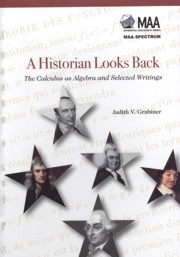Book contents
- Frontmatter
- Contents
- Introduction
- Part I The Calculus as Algebra
- Part II Selected Writings
- 1 The Mathematician, the Historian, and the History of Mathematics
- 2 Who Gave You the Epsilon? Cauchy and the Origins of Rigorous Calculus
- 3 The Changing Concept of Change: The Derivative from Fermat to Weierstrass
- 4 The Centrality of Mathematics in the History of Western Thought
- 5 Descartes and Problem-Solving
- 6 The Calculus as Algebra, the Calculus as Geometry: Lagrange, Maclaurin, and Their Legacy
- 7 Was Newton's Calculus a Dead End? The Continental Influence of Maclaurin's Treatise of Fluxions
- 8 Newton, Maclaurin, and the Authority of Mathematics
- 9 Why Should Historical Truth Matter to Mathematicians? Dispelling Myths while Promoting Maths
- 10 Why Did Lagrange “Prove” the Parallel Postulate?
- Index
- About the Author
4 - The Centrality of Mathematics in the History of Western Thought
from Part II - Selected Writings
- Frontmatter
- Contents
- Introduction
- Part I The Calculus as Algebra
- Part II Selected Writings
- 1 The Mathematician, the Historian, and the History of Mathematics
- 2 Who Gave You the Epsilon? Cauchy and the Origins of Rigorous Calculus
- 3 The Changing Concept of Change: The Derivative from Fermat to Weierstrass
- 4 The Centrality of Mathematics in the History of Western Thought
- 5 Descartes and Problem-Solving
- 6 The Calculus as Algebra, the Calculus as Geometry: Lagrange, Maclaurin, and Their Legacy
- 7 Was Newton's Calculus a Dead End? The Continental Influence of Maclaurin's Treatise of Fluxions
- 8 Newton, Maclaurin, and the Authority of Mathematics
- 9 Why Should Historical Truth Matter to Mathematicians? Dispelling Myths while Promoting Maths
- 10 Why Did Lagrange “Prove” the Parallel Postulate?
- Index
- About the Author
Summary
Introduction
Since this paper was first given to educators, let me start with a classroom experience. It happened in a course in which my students had read some of Euclid's Elements of Geometry. A student, a social science major, said to me, “I never realized mathematics was like this. Why, it's like philosophy!” That is no accident, for philosophy is like mathematics. When I speak of the centrality of mathematics in western thought, it is this student's experience I want to recapture—to reclaim the context of mathematics from the hardware store with the rest of the tools and bring it back to the university. To do this, I will discuss some major developments in the history of ideas in which mathematics has played a central role.
I do not mean that mathematics has by itself caused all these developments; what I do mean is that mathematics, whether causing, suggesting, or reinforcing, has played a key role; it has been there, at center stage. We all know that mathematics has been the language of science for centuries. But what I wish to emphasize is the crucial role of mathematics in shaping views of man and the world held not just by scientists, but by everyone educated in the western tradition.
Given the vastness of that tradition, I will give many examples only briefly, and be able to treat only a few key illustrative examples at any length. Sources for the others may be found in the bibliography. (See also [26].)
Since I am arguing for the centrality of mathematics, I will organize the paper around the key features of mathematics which have produced the effects I will discuss.
- Type
- Chapter
- Information
- A Historian Looks BackThe Calculus as Algebra and Selected Writings, pp. 163 - 174Publisher: Mathematical Association of AmericaPrint publication year: 2010



